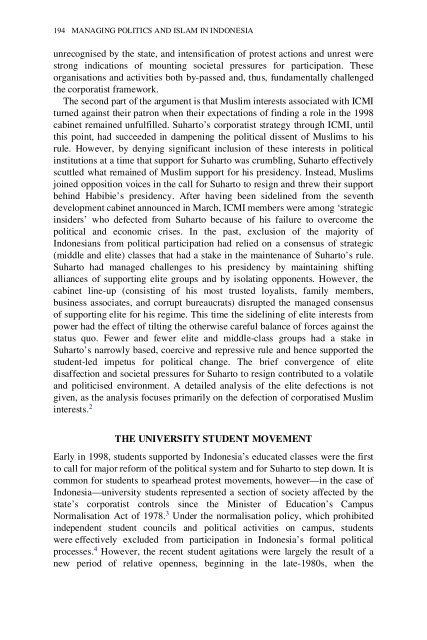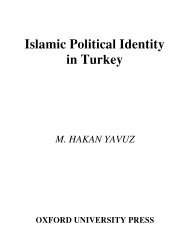Create successful ePaper yourself
Turn your PDF publications into a flip-book with our unique Google optimized e-Paper software.
194 MANAGING POLITICS AND ISLAM IN INDONESIAunrecognised by the state, <strong>and</strong> <strong>in</strong>tensification of protest actions <strong>and</strong> unrest werestrong <strong>in</strong>dications of mount<strong>in</strong>g societal pressures for participation. Theseorganisations <strong>and</strong> activities both by-passed <strong>and</strong>, thus, fundamentally challengedthe corporatist framework.The second part of the argument is that Muslim <strong>in</strong>terests associated with ICMIturned aga<strong>in</strong>st their patron when their expectations of f<strong>in</strong>d<strong>in</strong>g a role <strong>in</strong> the 1998cab<strong>in</strong>et rema<strong>in</strong>ed unfulfilled. Suharto’s corporatist strategy through ICMI, untilthis po<strong>in</strong>t, had succeeded <strong>in</strong> dampen<strong>in</strong>g the political dissent of Muslims to hisrule. However, by deny<strong>in</strong>g significant <strong>in</strong>clusion of these <strong>in</strong>terests <strong>in</strong> political<strong>in</strong>stitutions at a time that support for Suharto was crumbl<strong>in</strong>g, Suharto effectivelyscuttled what rema<strong>in</strong>ed of Muslim support for his presidency. Instead, Muslimsjo<strong>in</strong>ed opposition voices <strong>in</strong> the call for Suharto to resign <strong>and</strong> threw their supportbeh<strong>in</strong>d Habibie’s presidency. After hav<strong>in</strong>g been sidel<strong>in</strong>ed from the seventhdevelopment cab<strong>in</strong>et announced <strong>in</strong> March, ICMI members were among ‘strategic<strong>in</strong>siders’ who defected from Suharto because of his failure to overcome thepolitical <strong>and</strong> economic crises. In the past, exclusion of the majority of<strong>Indonesia</strong>ns from political participation had relied on a consensus of strategic(middle <strong>and</strong> elite) classes that had a stake <strong>in</strong> the ma<strong>in</strong>tenance of Suharto’s rule.Suharto had managed challenges to his presidency by ma<strong>in</strong>ta<strong>in</strong><strong>in</strong>g shift<strong>in</strong>galliances of support<strong>in</strong>g elite groups <strong>and</strong> by isolat<strong>in</strong>g opponents. However, thecab<strong>in</strong>et l<strong>in</strong>e-up (consist<strong>in</strong>g of his most trusted loyalists, family members,bus<strong>in</strong>ess associates, <strong>and</strong> corrupt bureaucrats) disrupted the managed consensusof support<strong>in</strong>g elite for his regime. This time the sidel<strong>in</strong><strong>in</strong>g of elite <strong>in</strong>terests frompower had the effect of tilt<strong>in</strong>g the otherwise careful balance of forces aga<strong>in</strong>st thestatus quo. Fewer <strong>and</strong> fewer elite <strong>and</strong> middle-class groups had a stake <strong>in</strong>Suharto’s narrowly based, coercive <strong>and</strong> repressive rule <strong>and</strong> hence supported thestudent-led impetus for political change. The brief convergence of elitedisaffection <strong>and</strong> societal pressures for Suharto to resign contributed to a volatile<strong>and</strong> politicised environment. A detailed analysis of the elite defections is notgiven, as the analysis focuses primarily on the defection of corporatised Muslim<strong>in</strong>terests. 2THE UNIVERSITY STUDENT MOVEMENTEarly <strong>in</strong> 1998, students supported by <strong>Indonesia</strong>’s educated classes were the firstto call for major reform of the political system <strong>and</strong> for Suharto to step down. It iscommon for students to spearhead protest movements, however—<strong>in</strong> the case of<strong>Indonesia</strong>—university students represented a section of society affected by thestate’s corporatist controls s<strong>in</strong>ce the M<strong>in</strong>ister of Education’s CampusNormalisation Act of 1978. 3 Under the normalisation policy, which prohibited<strong>in</strong>dependent student councils <strong>and</strong> political activities on campus, studentswere effectively excluded from participation <strong>in</strong> <strong>Indonesia</strong>’s formal politicalprocesses. 4 However, the recent student agitations were largely the result of anew period of relative openness, beg<strong>in</strong>n<strong>in</strong>g <strong>in</strong> the late-1980s, when the




